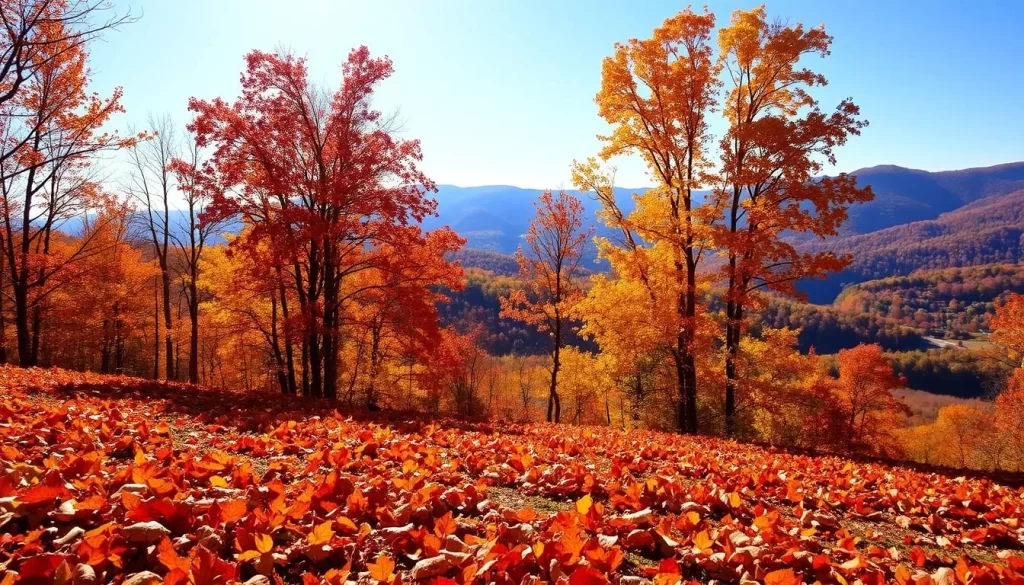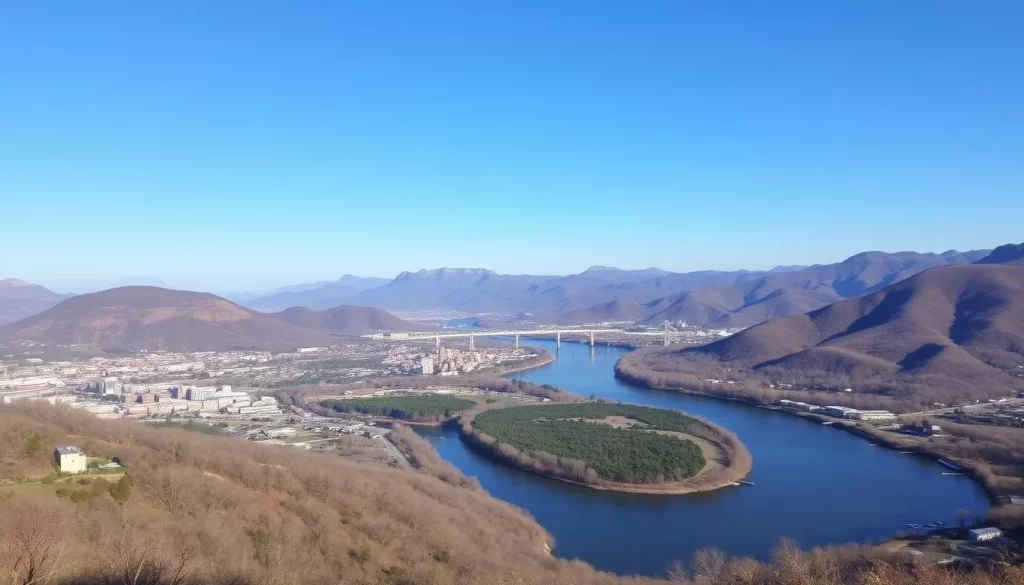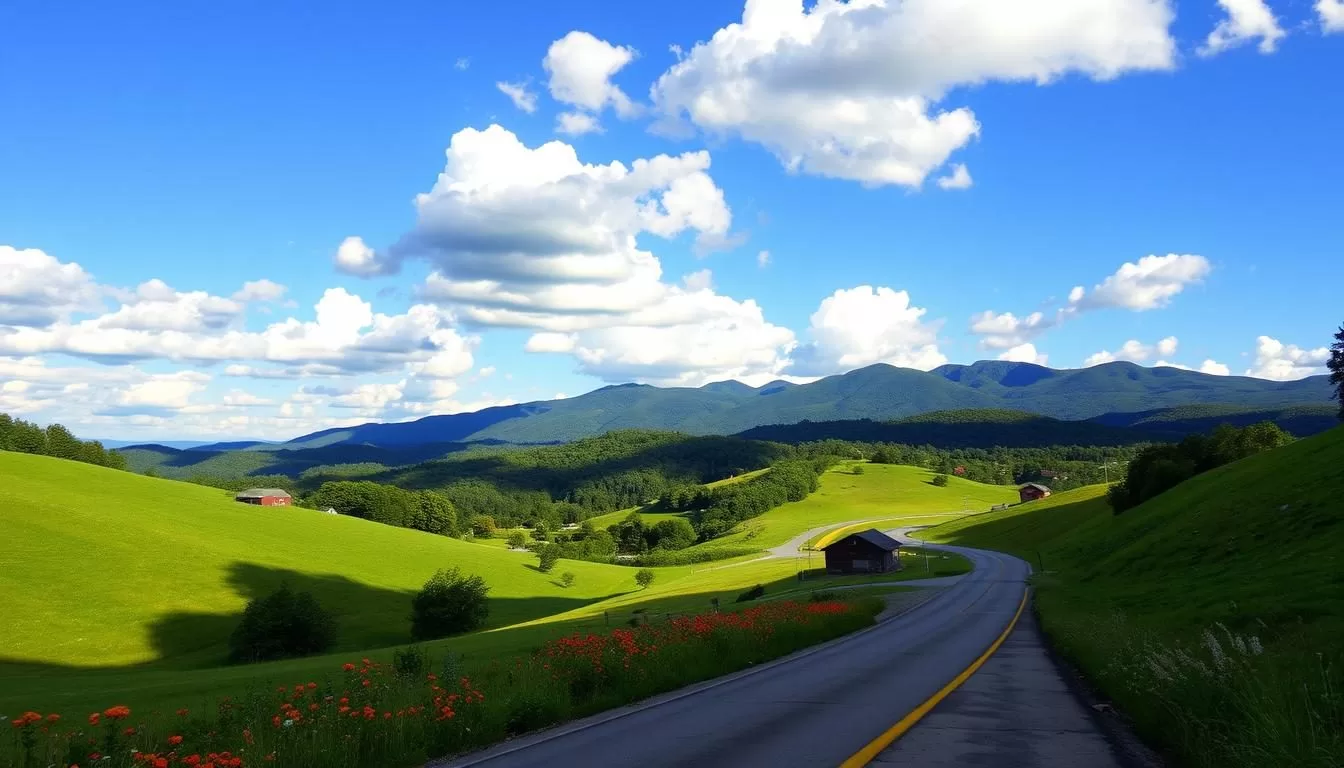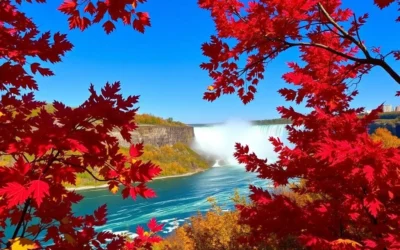Planning a trip to Tennessee requires more than just picking a destination; it demands understanding the weather that shapes your travel experience. With mild and wet conditions prevailing throughout the year, Nashville, a key city in Tennessee, is a great place to visit anytime. However, certain seasons stand out as particularly favorable for travelers who are weather-conscious.
The state’s diverse climate means that temperatures and precipitation patterns vary significantly across the months and seasons. By understanding these patterns, you can plan a trip that avoids unfavorable weather, making the most of your time in Tennessee. Whether you’re drawn to the vibrant blooms of spring or the colorful foliage of fall, this guide will help you choose the ideal time for your visit.
Understanding Tennessee’s Climate Year-Round
Understanding the climate in Tennessee is crucial for planning a trip that suits your preferences. Tennessee’s climate varies significantly throughout the year, with each season offering unique conditions.
Temperature Ranges Through Seasons
Tennessee experiences a range of temperatures across the seasons. In spring, temperatures are mild, with highs over 70°F and lows around 50°F. Summer is hot and humid, with temperatures often exceeding 90°F. Autumn brings a cool-down, with highs ranging from 80°F to 60°F. Winters are mild but wet, with temperatures between 30°F and 50°F.
Humidity and Precipitation Patterns
The state’s humidity is moderate to high, with significant rainfall throughout the year. Summers are the most humid, while winters are damp and rainy, with monthly rainfall varying from 2.9 to 5.1 inches.
Impact of Weather on Tourism
The weather significantly impacts tourism in Tennessee. Understanding the climate year-round helps you plan your trip according to your weather preferences and planned activities. Peak tourist seasons are influenced by the weather, with some seasons being more favorable for outdoor activities than others.
- The climate varies significantly across four distinct seasons.
- Summer is hot and humid, while winter is mild but wet.
- Understanding the humidity and precipitation patterns helps in planning outdoor activities.

Spring in Nashville: March to May
The spring season in Nashville, spanning from March to May, offers a unique blend of pleasant weather and cultural events. As the city transitions from cold winter days to mild and pleasant temperatures, it’s considered one of the best times to visit.
Temperature and Rainfall Expectations
During spring, temperatures in Nashville gradually warm up. In March, lows are around 39°F (4°C) and highs around 61°F (16°C). By April, temperatures range from 48°F (9°C) to 71°F (22°C), and in May, they further increase to lows of 57°F (14°C) and highs of 78°F (26°C). However, May is also the rainiest month, with an average of 5.5 inches of rainfall.
| Month | Low Temp | High Temp | Rainfall |
|---|---|---|---|
| March | 39°F (4°C) | 61°F (16°C) | 4.2 inches |
| April | 48°F (9°C) | 71°F (22°C) | 4.5 inches |
| May | 57°F (14°C) | 78°F (26°C) | 5.5 inches |
Spring Events and Festivals
Spring in Nashville is vibrant with events and festivals. April hosts the Nashville Cherry Blossom Festival, a highlight of the season, along with various outdoor music events showcasing the city’s cultural scene.
Outdoor Activities in Spring
The outdoor activities in spring are plentiful, thanks to the blooming wildflowers and pleasant weather. Visitors can enjoy hiking, exploring urban parks, and patio dining, making spring a perfect time to experience Nashville’s charm.
Summer Heat and Entertainment: June to August
As summer sets in, Nashville becomes a hub of vibrant entertainment, despite the sweltering heat. The city’s summer weather is characterized by high temperatures and humidity, making it essential for visitors to be prepared.
Managing the Humid Summer Climate
The summer climate in Nashville is hot and humid, with temperatures ranging from 70°F to 90°F. To manage the heat, it’s crucial to stay hydrated and wear light, breathable clothing. Visitors can also take advantage of the city’s many indoor attractions to escape the heat.
Popular Summer Events and Festivals
Nashville hosts several iconic summer events, including the CMA Fest in June, which draws country music fans worldwide. The Bonnaroo Music and Arts Festival, also in June, offers a multi-day experience with music, comedy, and more. Additionally, the July 4th Let Freedom Sing Celebration is a highlight, featuring live music, fireworks, and community spirit.
Tips for Summer Visitors
To make the most of their visit, summer travelers should plan outdoor activities during the cooler parts of the day. Staying cool and hydrated is key. Here’s a quick guide to help you navigate Nashville’s summer:
| Activity | Best Time | Tips |
|---|---|---|
| Outdoor Exploration | Early morning or late evening | Wear light, breathable clothing |
| Visiting Indoor Attractions | Anytime | Stay hydrated, take breaks |
| Attending Outdoor Events | Check event schedules | Bring sunscreen, stay hydrated |

Fall’s Perfect Weather Window: September to November
As the summer heat dissipates, Nashville transforms into a vibrant autumn destination, offering a perfect blend of comfortable weather and exciting events. From September to November, the city experiences a gentle cooling of temperatures, making it an ideal time to visit.
Temperature and Foliage Changes
During the fall season, Nashville’s temperatures range from 83°F/62°F in September to 61°F/39°F in November. October is particularly pleasant, with low humidity and cool temperatures. The foliage changes are stunning, with the city’s landscapes turning into vibrant shades of red, orange, and yellow.

Fall Festivals and Events
The fall season in Nashville is filled with exciting festivals and events. You can attend the Tennessee State Fair, Americanafest, and the Nashville Whiskey Festival, which showcase the region’s culture and flavors. These events provide a great opportunity to experience the city’s vibrant atmosphere.
Best Outdoor Activities in Autumn
The autumn season offers a range of outdoor activities to enjoy. You can take a scenic drive through the colorful landscapes, go hiking on trails with spectacular views of fall foliage, or simply enjoy the natural beauty of the surroundings. The comfortable weather makes it an ideal time to explore both urban and natural attractions.
Tennesee, United States: Best Months for a Weather-Savvy Trip

Planning a trip to Tennessee requires understanding its seasonal weather patterns. The state’s climate varies significantly throughout the year, offering a range of experiences for visitors.
Prime Visiting Months
The best months to visit Tennessee are during spring (April-May) and fall (September-October). These periods offer mild weather, fewer crowds, and more affordable prices for flights and hotels, making them ideal for a weather-savvy trip.
Weather Considerations for Planning
When planning your trip, it’s crucial to consider Tennessee’s weather. Avoiding the peak summer months (June-August) can help you steer clear of the hot and humid climate. Understanding the seasonal weather patterns will help you make the most of your visit.
Seasonal Highlights and Activities
Tennessee is known for its rich cultural heritage and outdoor activities. During spring and fall, you can enjoy seasonal activities like hiking, visiting historical sites, and participating in local festivals. These seasons provide the perfect backdrop for exploring the state’s natural beauty and cultural attractions.
Winter in Music City: December to February
Nashville’s winter season, spanning from December to February, brings a unique charm to Music City. The city’s mild climate means that temperatures usually range from 30°F to 50°F, making it relatively warmer compared to other parts of the country.
Temperature and Snowfall Expectations
During these months, you can expect chilly temperatures, but snowfall is rare, occurring only 2-3 times a year with minimal accumulation of 1-2 inches. This makes winter an ideal time for those who prefer milder cold weather.
Winter Events and Celebrations
Winter in Nashville is filled with exciting events and celebrations. The iconic New Year’s Eve festivities in downtown Nashville are a must-see, featuring the Music Note Drop and live music performances. You can also enjoy seasonal concerts and festive decorations throughout the city.
Planning for Winter Weather
When planning your winter trip, consider packing appropriate clothing for the chilly temperatures. Be prepared for occasional inclement weather by checking forecasts and having flexible travel plans. With fewer tourists during the winter months, you can enjoy a more relaxed experience and potentially lower costs.
| Month | Average Temperature (°F) | Events |
|---|---|---|
| December | 40-50 | Holiday festivities, Christmas markets |
| January | 30-40 | Winter concerts, ice skating |
| February | 35-45 | Mardi Gras celebrations, Valentine’s events |

Packing Guidelines for Tennessee’s Weather
To ensure a comfortable and enjoyable trip to Tennessee, it’s crucial to pack according to the state’s varying weather conditions. The right clothes and gear can greatly improve your comfort and fun, allowing you to focus on enjoying your trip.
Seasonal Wardrobe Essentials
When it comes to packing for Tennessee, the season you visit plays a significant role. For spring and fall, you’ll need lightweight jackets, layers, and rain gear to handle the temperature fluctuations and potential rain. In the summer, pack light, breathable clothes and swimwear to stay cool in the hot, humid climate. During winter, wear warm layers like sweaters, coats, and waterproof shoes or boots to stay warm.
Weather-Related Travel Gear
In addition to seasonal wardrobe essentials, it’s also important to consider travel gear that will enhance your Tennessee experience. This includes rain protection for spring showers and sun protection for summer explorations. By being prepared with the right gear, you’ll be able to enjoy the state’s outdoor activities without worrying about the weather or temperatures.
Weather Impact on Tennessee’s Famous Attractions
Weather conditions in Tennessee have a profound impact on the enjoyment of its renowned attractions. The state’s varied climate influences visitor experiences at popular sites, from Nashville’s music venues to the Great Smoky Mountains.
Indoor Activities for Inclement Weather
When the weather is unfavorable, Tennessee offers a range of excellent indoor activities. You can explore world-class museums like the Country Music Hall of Fame in Nashville, which provides a cool respite from the summer heat. Historic sites and entertainment venues are also great alternatives during rainy or extremely hot days. These indoor attractions ensure that your trip remains enjoyable regardless of the weather outside.
Weather-Dependent Outdoor Attractions
Tennessee’s outdoor attractions are best enjoyed during favorable weather conditions. Spring and fall are ideal for visiting places like Centennial Park in Nashville, where you can enjoy live music and mild temperatures. In contrast, summer’s high temperatures and humidity might make outdoor activities less comfortable. Understanding the weather’s impact on outdoor attractions helps you plan your itinerary accordingly, making the most of your visit.
Exploring the Great Smoky Mountains: Seasonal Guide

Tennessee’s crown jewel, the Great Smoky Mountains, transforms with the seasons, providing a unique adventure each time you visit. The park’s diverse landscape and climate ensure that every season offers something new and exciting.
Spring and Summer in the Smokies
During spring and summer, the Smoky Mountains come alive with vibrant wildflowers and lush greenery. These seasons are ideal for hiking and exploring the park’s many trails, with temperatures ranging from mild to warm. Summer months, particularly June, July, and August, are peak tourist season, offering warm weather and long days perfect for outdoor activities.
Fall Foliage and Winter Wonderland
As fall arrives, the Smoky Mountains are painted with vibrant colors, making it a prime time for leaf peeping and scenic drives. The fall foliage typically peaks in late October, attracting visitors from all over. In winter, the park transforms into a serene landscape, with snowfall offering opportunities for winter sports and peaceful hikes.
Memphis Weather Patterns and Best Visiting Times

Understanding Memphis’s weather patterns is crucial for planning a comfortable and enjoyable trip. Memphis, known for its rich musical heritage and historical landmarks, experiences a humid subtropical climate, characterized by hot summers and mild winters.
The best times to visit Memphis are during the spring (April-June) and fall (September-November), when the temperatures are mild and humidity is relatively low. These periods offer ideal conditions for exploring the city’s outdoor attractions and enjoying its vibrant cultural scene.
Seasonal Highlights in Memphis
Memphis’s seasonal highlights include spring music festivals, summer riverfront activities, and fall cultural events. In the spring, the city comes alive with music festivals celebrating its rich musical heritage. Summer brings long days perfect for enjoying the Mississippi River on a riverboat cruise. Autumn in Memphis is marked by cultural events and festivals that showcase the city’s history and diversity.
Weather Considerations for Memphis Attractions
When planning your visit to Memphis’s famous attractions like Graceland, Beale Street, and the National Civil Rights Museum, consider the weather. Summer heat and humidity might make outdoor explorations challenging, while the mild spring and fall weather are ideal for visiting these sites. Winters, although cooler, can be a good time to visit indoor attractions without the crowds.
Chattanooga’s Climate: When to Visit
When planning a trip to Chattanooga, understanding its climate is crucial to making the most of your visit.

Chattanooga’s climate is characterized by its location in the Tennessee Valley, surrounded by mountains and rivers. The best times to visit are during spring (April-June) and fall (September-November), when the weather is mild and conducive to outdoor activities.
Outdoor Adventure Seasons
For outdoor enthusiasts, Chattanooga offers a range of activities that are best enjoyed during certain seasons. Spring brings mild temperatures, making it ideal for hiking and rock climbing. Fall offers comfortable temperatures and scenic foliage, perfect for whitewater rafting and exploring the numerous trails.
The outdoor adventure seasons in Chattanooga are characterized by favorable weather conditions, with temperatures ranging from 60°F to 80°F (15°C to 27°C) during spring and fall.
Urban Exploration Weather Tips
When exploring Chattanooga’s urban areas, the weather plays a significant role in enhancing your experience. The spring and fall seasons are also ideal for visiting the city’s revitalized areas, such as the Riverfront, Bluff View Art District, and Northshore neighborhood. These periods offer pleasant temperatures, making it comfortable to walk around and enjoy the city’s attractions.
Visiting attractions like Lookout Mountain, Ruby Falls, and the Tennessee Aquarium can be done year-round, but the weather during spring and fall makes these experiences even more enjoyable.
Tennessee’s Festival Calendar and Weather Considerations
Tennessee hosts a diverse range of festivals throughout the year, each influenced by the state’s varying weather conditions. Whether you’re visiting in the spring, summer, fall, or winter, there’s always a festival or event to enjoy.
Music Festivals and Weather Planning
Music festivals are a big part of Tennessee’s cultural identity. Events like Nashville’s CMA Fest and Memphis’s Beale Street Music Festival draw large crowds. When planning to attend these outdoor festivals, it’s essential to consider the weather. For instance, summer festivals often take place during hot and humid conditions, while spring and fall events might be more pleasant. The Killer Nashville conference, held in August, is a four-day event that takes advantage of the city’s temperate climate.
Cultural Events Throughout the Seasons
Tennessee’s cultural events are not limited to music festivals. The state celebrates various cultural experiences throughout the year. In the spring, you can enjoy cherry blossom festivals, while summer brings music events and outdoor activities. Fall is the time for harvest celebrations, and winter offers holiday experiences. The Full Moon Pickin’ Parties at the Warner Park Equestrian Center, for example, run from May through October, capitalizing on the pleasant weather.
| Season | Festivals/Events | Weather Conditions |
|---|---|---|
| Spring | Cherry Blossom Festivals, Spring Music Events | Mild temperatures, occasional rain |
| Summer | Outdoor Music Festivals, Summer Celebrations | Hot and humid |
| Fall | Harvest Celebrations, Fall Foliage Events | Comfortable temperatures, foliage |
| Winter | Holiday Experiences, Winter Markets | Cold, potential snowfall |
Conclusion
The Volunteer State offers a unique experience in every season, making it a perfect destination for various interests. When you plan your trip to Tennessee, consider what you want to do and how you like the weather. You have gained comprehensive insight into Tennessee’s weather patterns throughout the year and how they can impact your travel experience.
With this knowledge, you can confidently plan a trip that aligns with your ideal weather conditions. Whether you enjoy summer music festivals, spring landscapes, fall foliage, or winter holiday charm, Tennessee has something for everyone. You can now choose the best time and months for your visit based on your preferences and planned activities.
The above is subject to change.
Check back often to TRAVEL.COM for the latest travel tips and deals.




